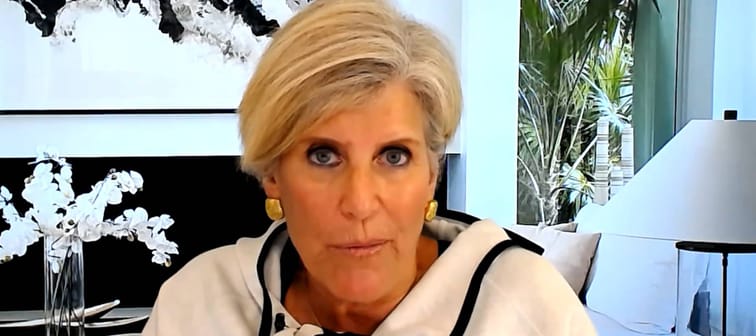1. Don't take a tax refund
"If you’re getting a tax refund, you are making one of the biggest mistakes out there," Suze Orman told CNBC in 2019.
Why? Because you've essentially had too much of your pay withheld for taxes — and have effectively given the government an interest-free loan. When you're owed a $2,400 refund, you've allowed yourself to be shortchanged $200 per month throughout the year.
In the past, Orman has called a tax refund "the biggest waste of money that you will ever get."
But surveys have shown that Americans love their tax refunds and eagerly plan out how they'll use the money each year.
These days, Orman says unless you make a plan for the money and stick to it, you'll likely end up spending it on something you don't need.
If you do end up getting a refund, she says paying down credit card debt, putting the money in a Roth IRA is your best bet for long-term financial security. But there's also something you can do to bolster your finances in the short term.
"There is no smarter move than working on your emergency savings account if you’ve yet to accumulate up to a year’s worth of living expenses," she wrote on her blog in March.
Read more: Want to invest your spare change but don't know where to start? There's an app for that
Kiss Your Credit Card Debt Goodbye
Having a single loan to pay off makes it easier to manage your payments, and you can often get a better interest rate than what you might be paying on credit cards and car loans.
Fiona is an online marketplace offering personalized loan options based on your unique financial situation.
When you consolidate your debt with a personal loan, you can roll your payments into one monthly installment. Find a lower interest rate and pay down your debt faster today.
Get Started2. Don't lease a car
In Suze Orman's words, "you should never, ever ever ever, lease a car."
If you lease, you'll sink your money into several years' worth of car payments and be empty-handed when the lease term is done.
Financing is a better option, but Orman has said if it will take longer than three years to pay off the car, then it’s out of your price range.
Buying a used car is another way to go. Models that are just a few years old will have great safety specifications and the same audio-visual tech as a new car, at a fraction of the price.
When it comes to buying a car in the current market, Orman's advice is simple:
"Your goal should be to buy the least expensive car. Period."
3. Don’t skimp on car insurance
Car insurance policies include three key areas of coverage: for bodily injury liability per person, for total bodily injury liability, and for property damage you cause. Minimum coverage amounts in many states are, respectively, $25,000, $50,000 and $25,000.
Orman doesn’t think that’s nearly enough. "It will be a financial disaster paying out of pocket for serious injuries, loss of wages, rehab and such for the other driver (and their passengers) if you cause an accident," she says on her website.
WalletHub conducted a study saying that the minimum amount of monthly coverage costs the average American $60. It makes sense to shop around to find a better policy that fits your needs and your budget.
Raising your deductibles can also result in significant savings.
Stop overpaying for home insurance
Home insurance is an essential expense – one that can often be pricey. You can lower your monthly recurring expenses by finding a more economical alternative for home insurance.
SmartFinancial can help you do just that. SmartFinancial’s online marketplace of vetted home insurance providers allows you to quickly shop around for rates from the country’s top insurance companies, and ensure you’re paying the lowest price possible for your home insurance.
Explore better rates4. Don't spend on things you don't really need
Earlier this month Orman wrote: "Now is not the time to stretch to buy things that aren’t 100% necessary if you’re still working on building up your savings or paying off your debt."
There’s no better way to kick-start your savings than by playing the need vs. want game.
The next time you're ready to buy something, ask yourself whether you really need it. Is it a necessity, such as medication, food from the grocery store or a solid pair of shoes for work?
Or simply something you want — like another drink at the bar, fast food for dinner again or the lastet gadget?
If you get a cash windfall — like your tax refund — resist the urge.
It's much less exciting, but no less important, to save that money at a time when the cost of almost everything is higher.
In a February blog post, Orman said she hopes "you are laser-focused on being a shopping ninja".
"My challenge is to ask yourself at checkout: “If I had to pay 100% of the cost right now, rather than just 25%, would I still buy it? Could I buy it without it becoming unpaid credit card debt?” If either answer is no, that’s a sign you’re about to make a costly mistake."
5. Don't waste money on coffee
Your daily stop to pick up a cup of dark roast or a cappuccino is a habit you need to break, the money maven says. It's a "want," not a "need," and it's costing you a ton of money.
"You are peeing $1 million down the drain as you are drinking that coffee," Orman once told CNBC (causing coffee drinkers across America to do a spit take).
Here's the math on that: If you're spending $100 a month, that's money that could grow instead in a Roth IRA — to roughly $1 million after 40 years, assuming a 12% rate of return.
But you love those fancy store-bought coffees? Get over that. "Every single penny counts" when you're saving for your future, she said.
There are plenty of other ways to use that money. You could invest that spare change or use it to beef up your savings or emergency fund — which could come in handy as inflation continues to drive up your monthly bills.
Sponsored
Follow These Steps if you Want to Retire Early
Secure your financial future with a tailored plan to maximize investments, navigate taxes, and retire comfortably.
Zoe Financial is an online platform that can match you with a network of vetted fiduciary advisors who are evaluated based on their credentials, education, experience, and pricing. The best part? - there is no fee to find an advisor.







